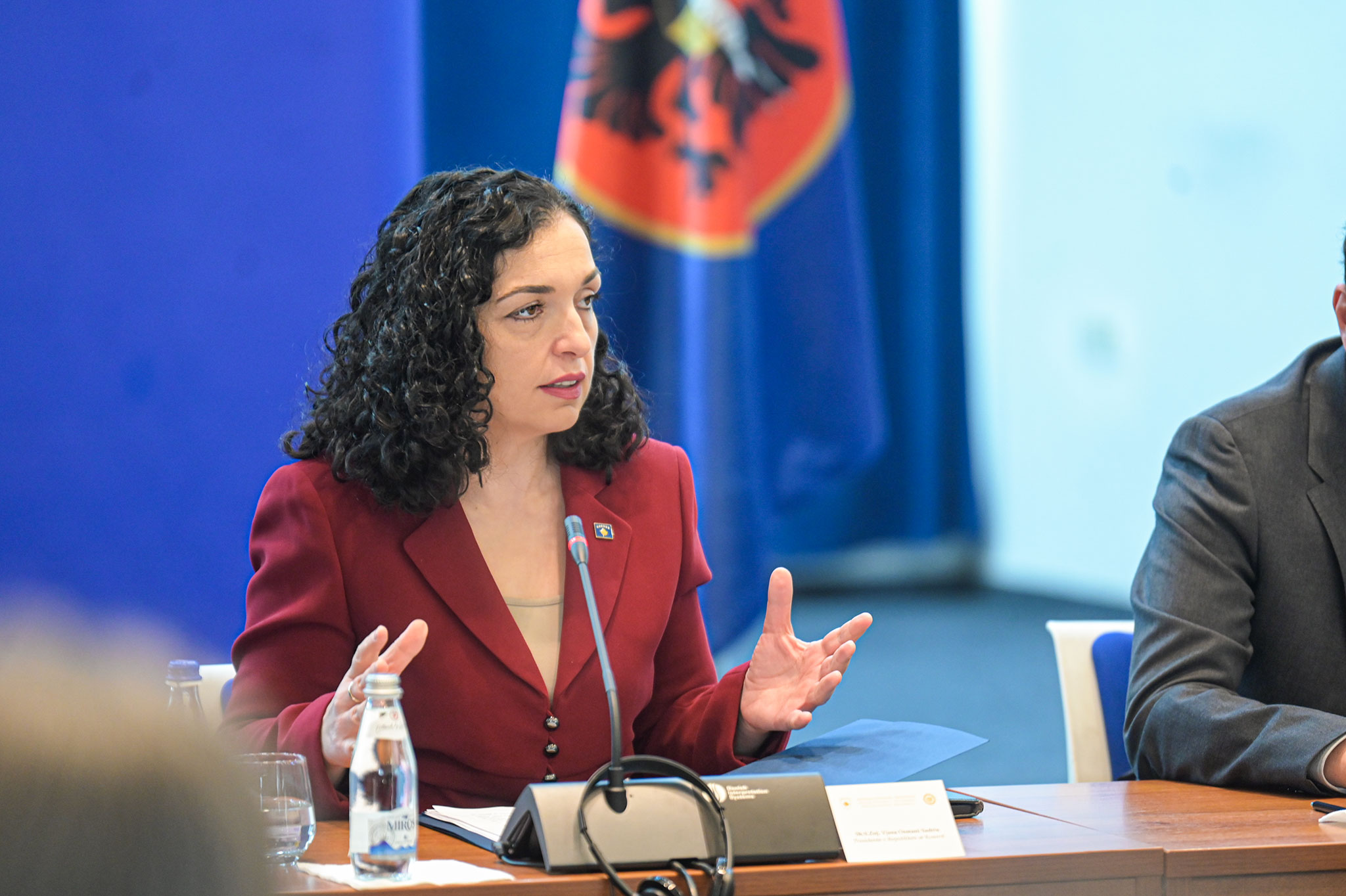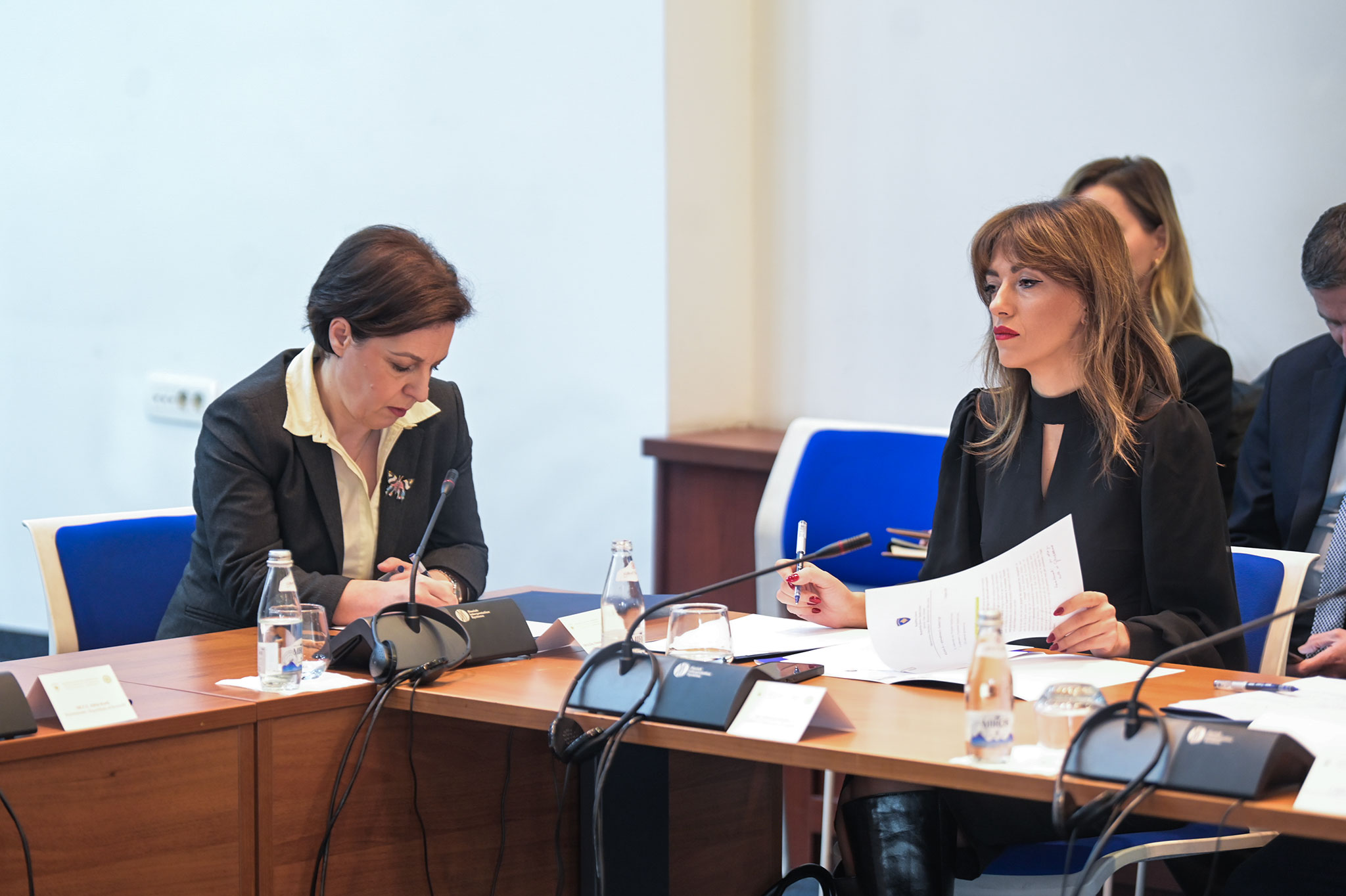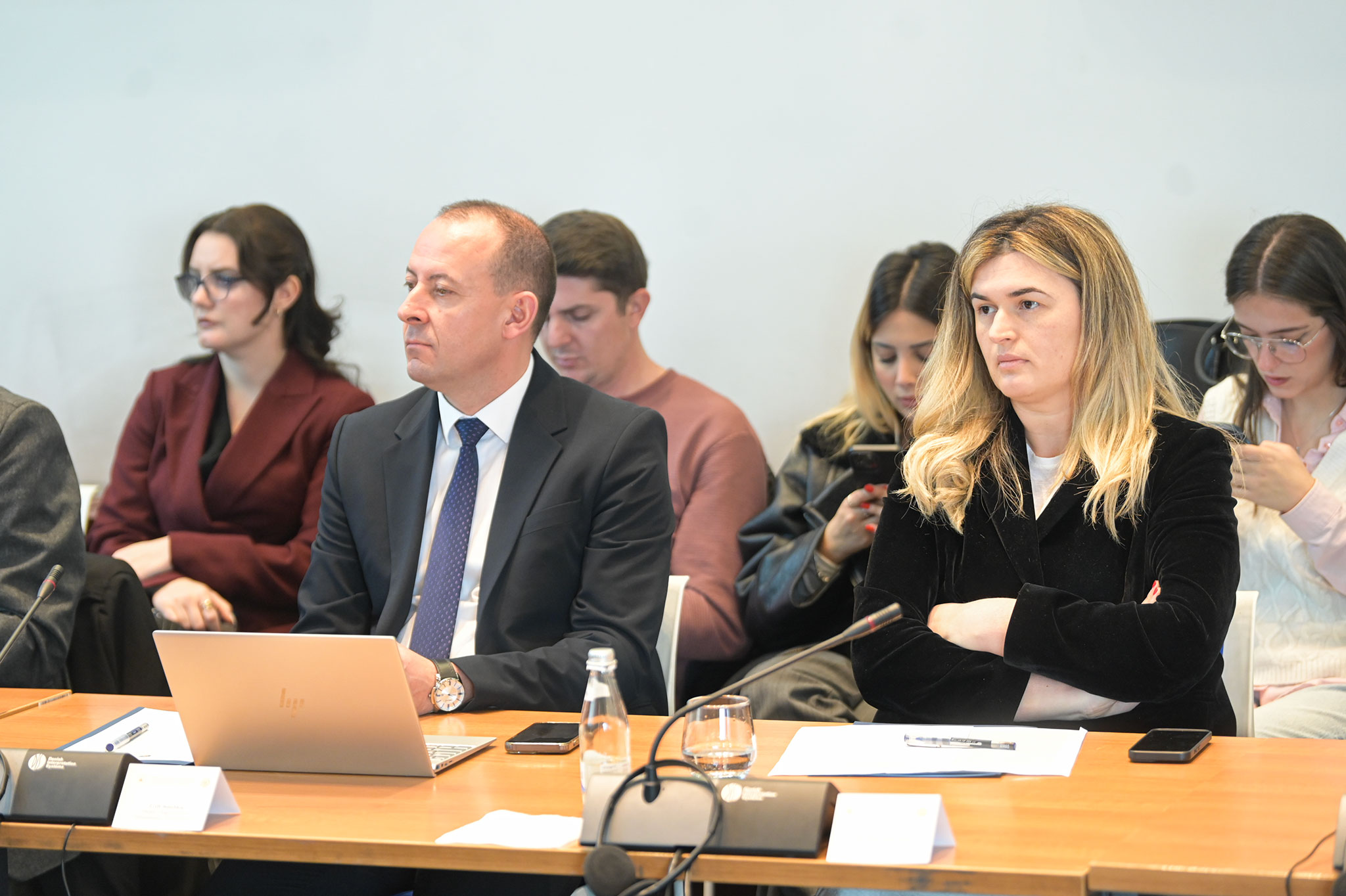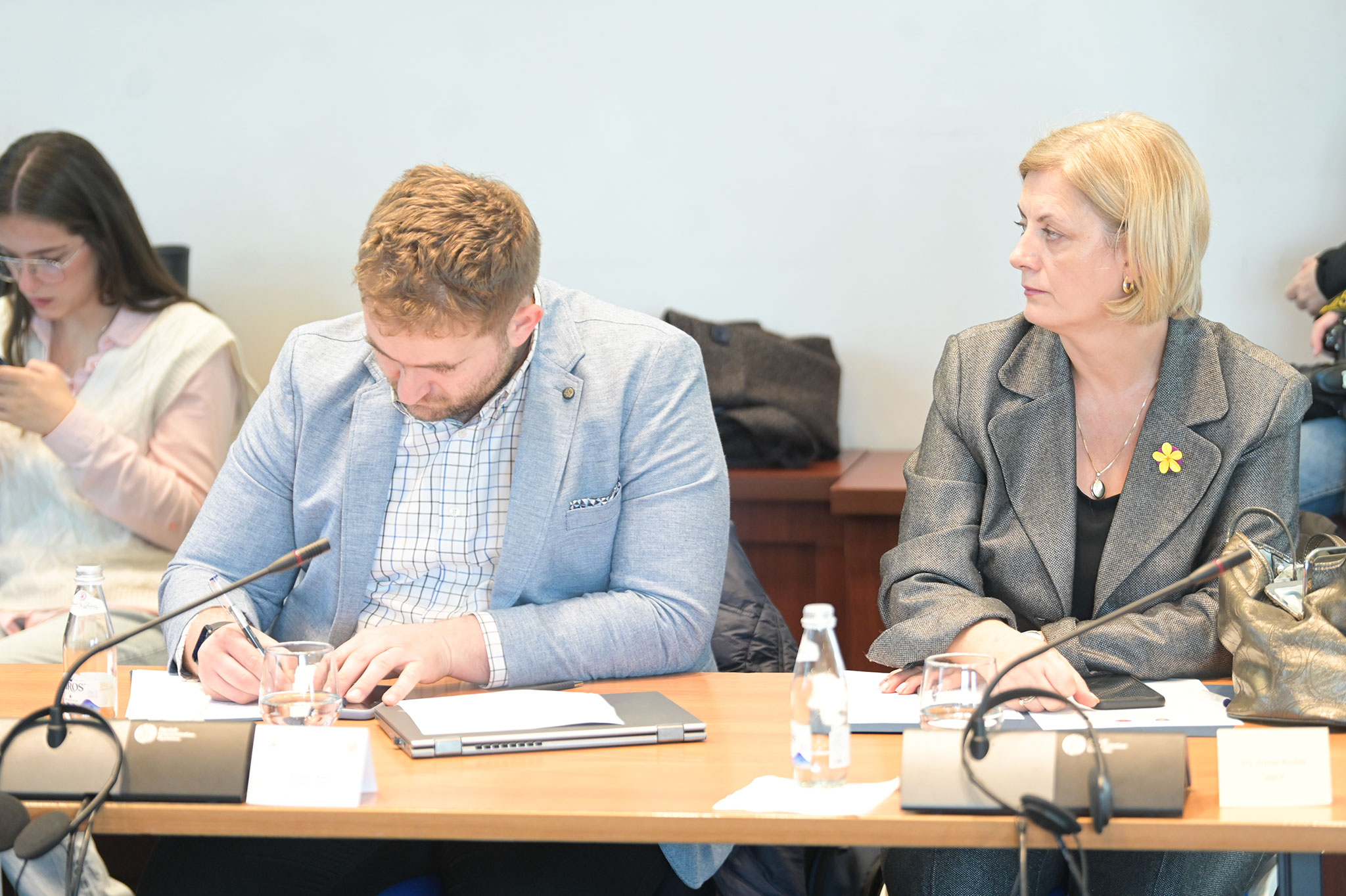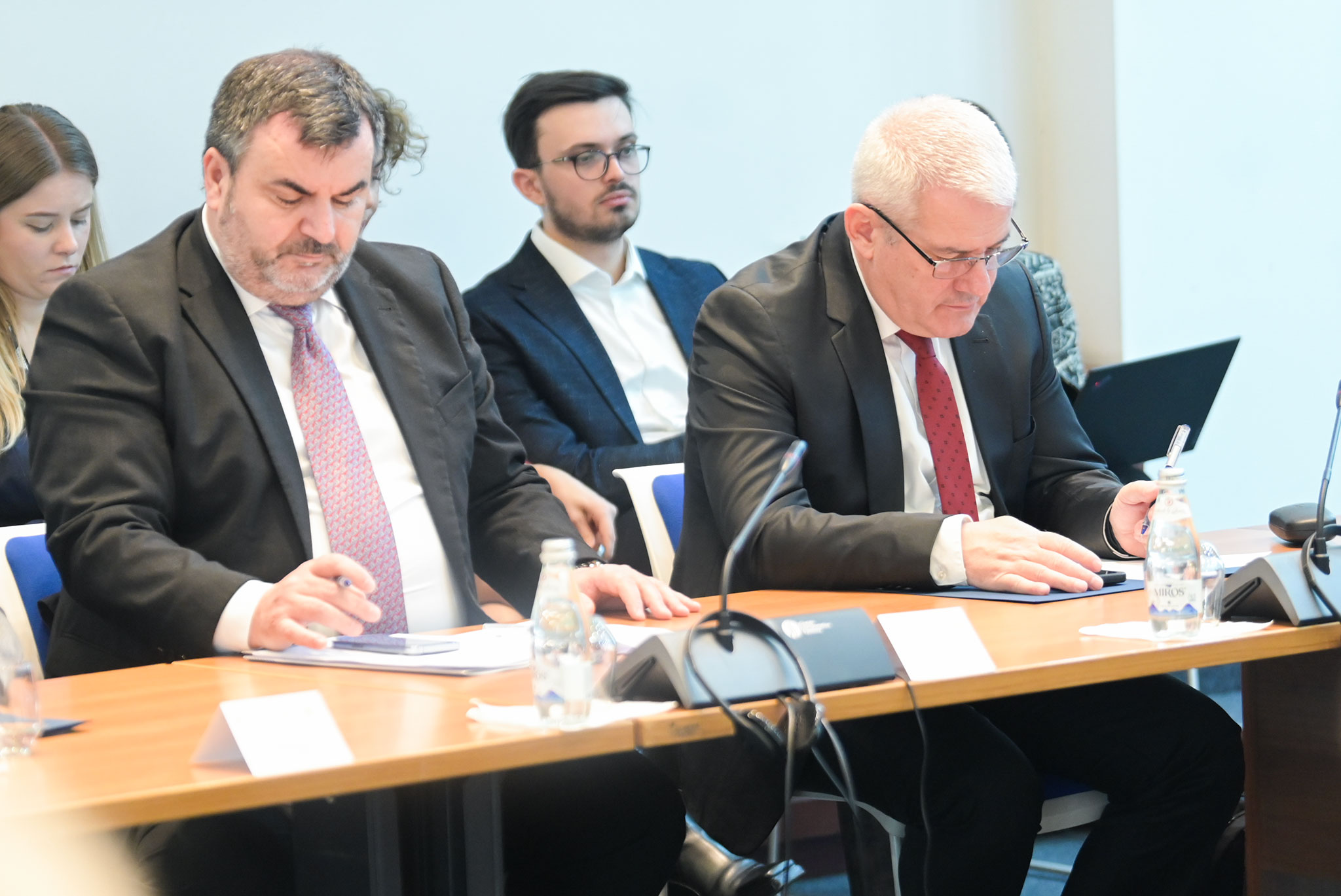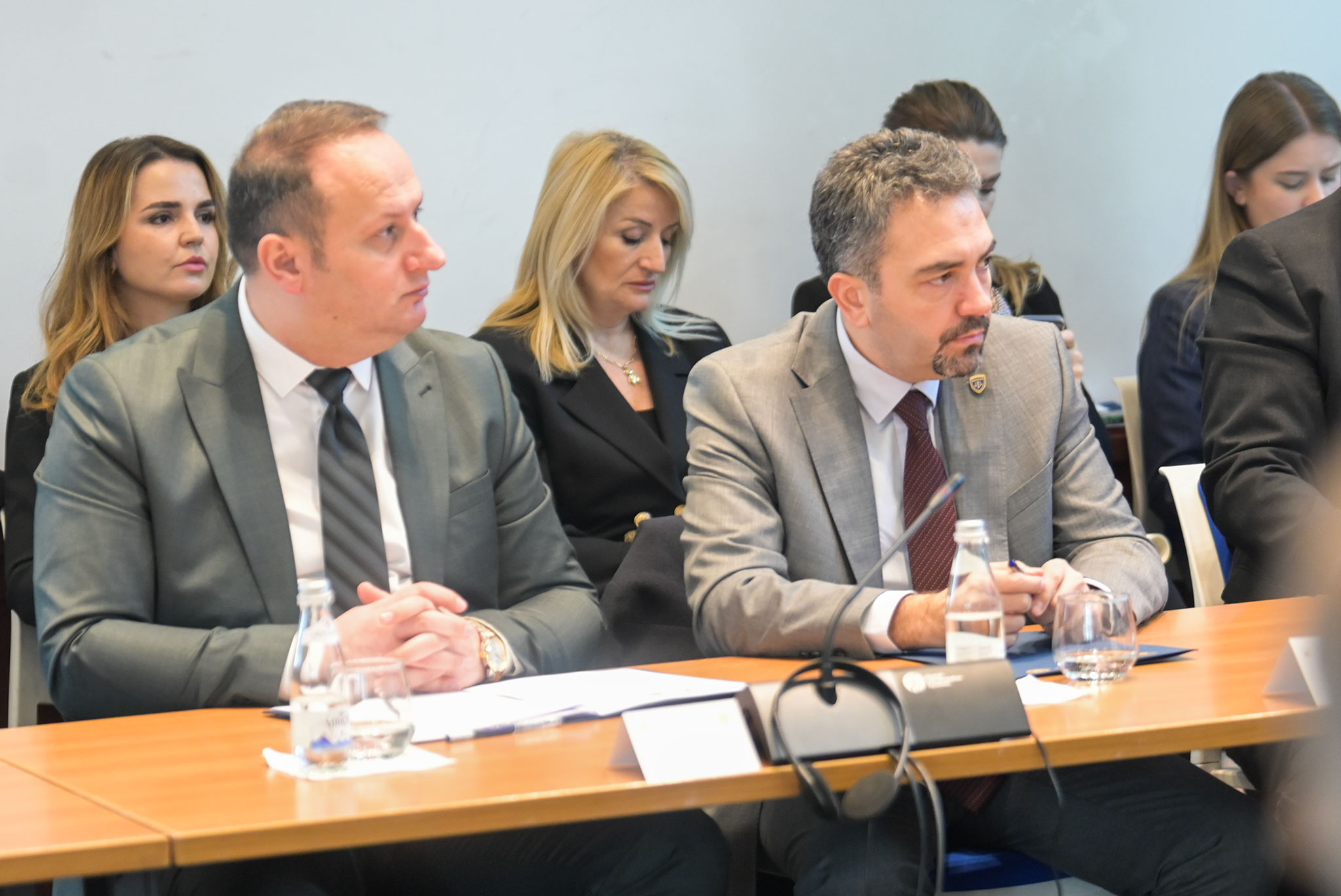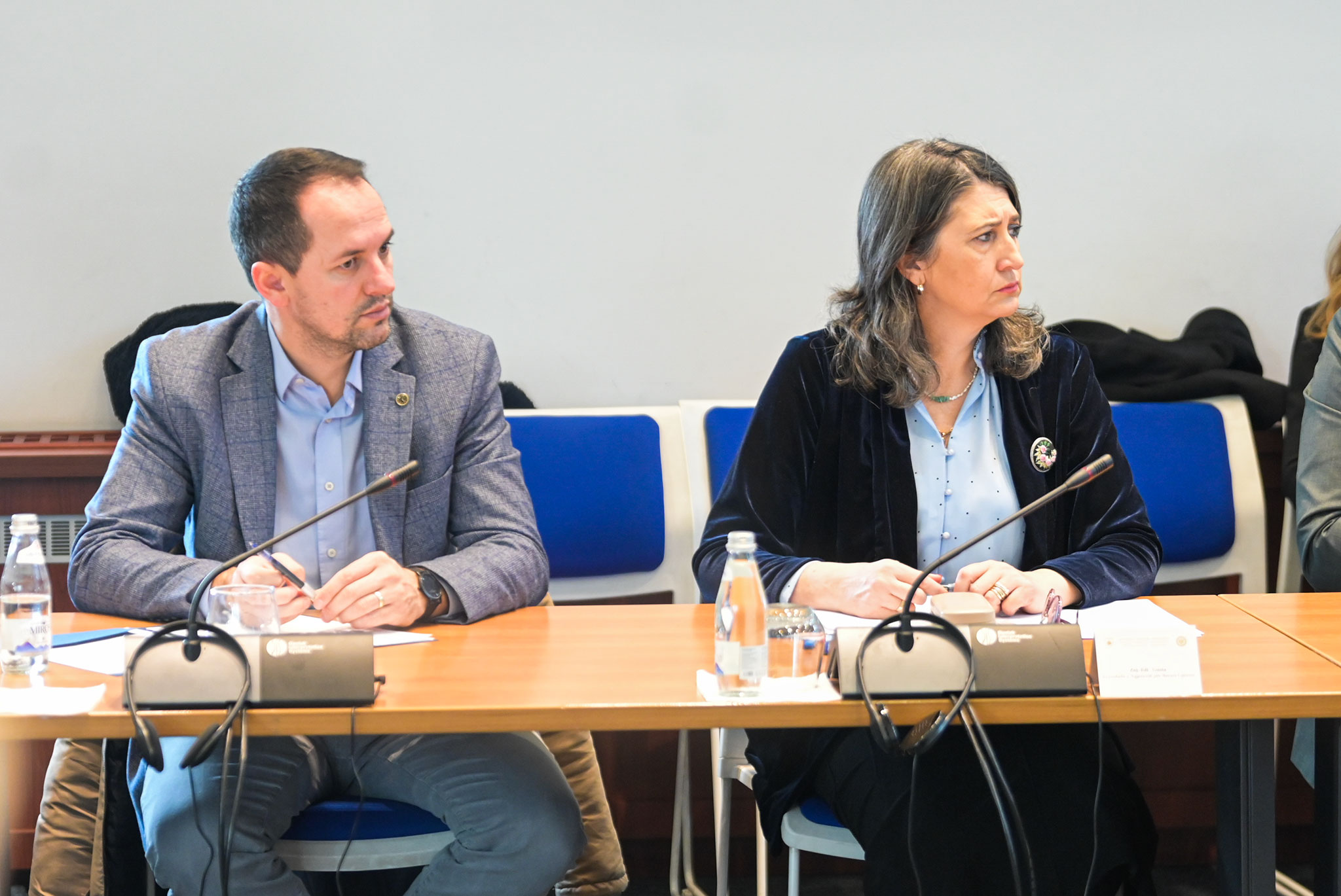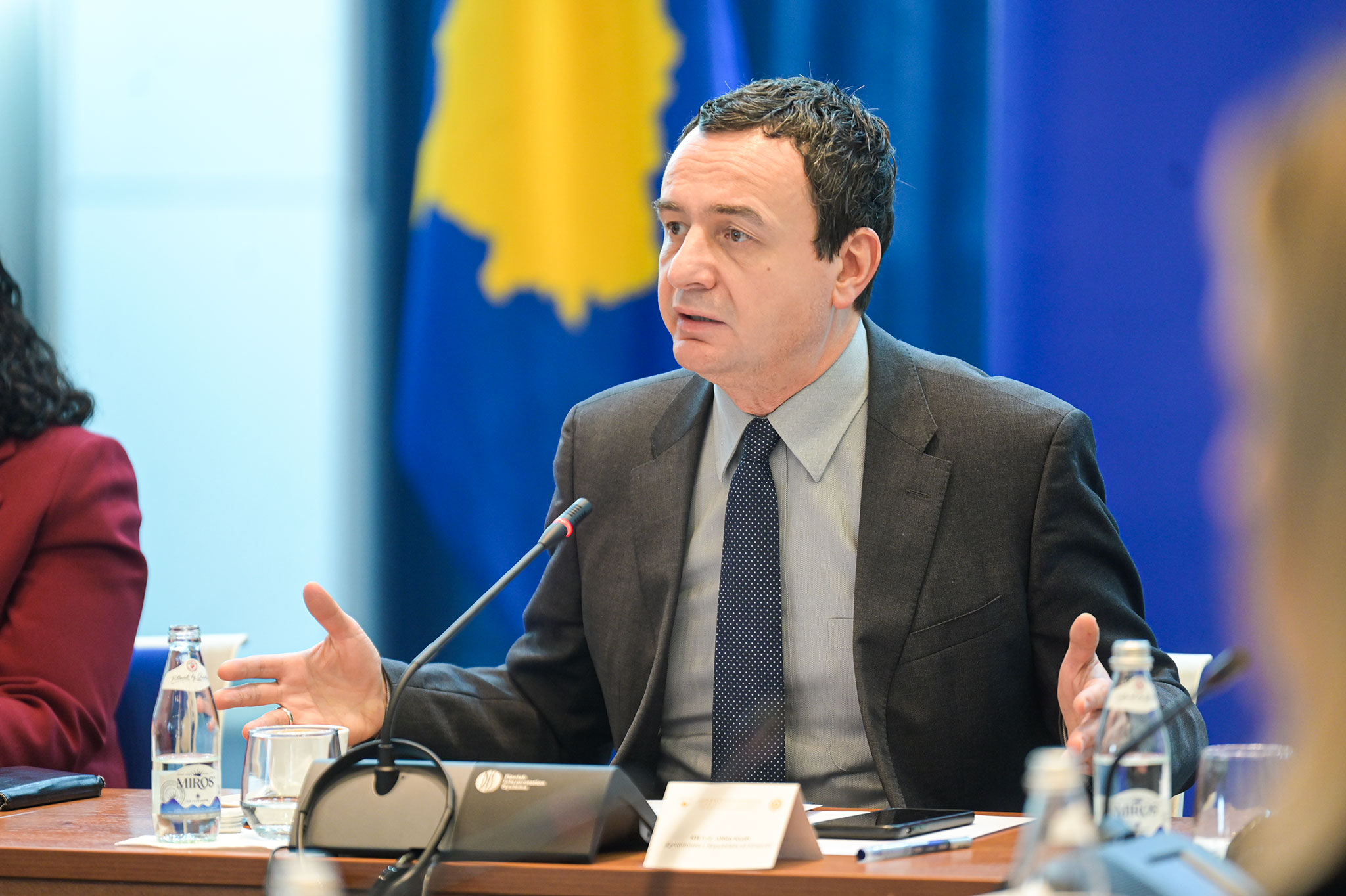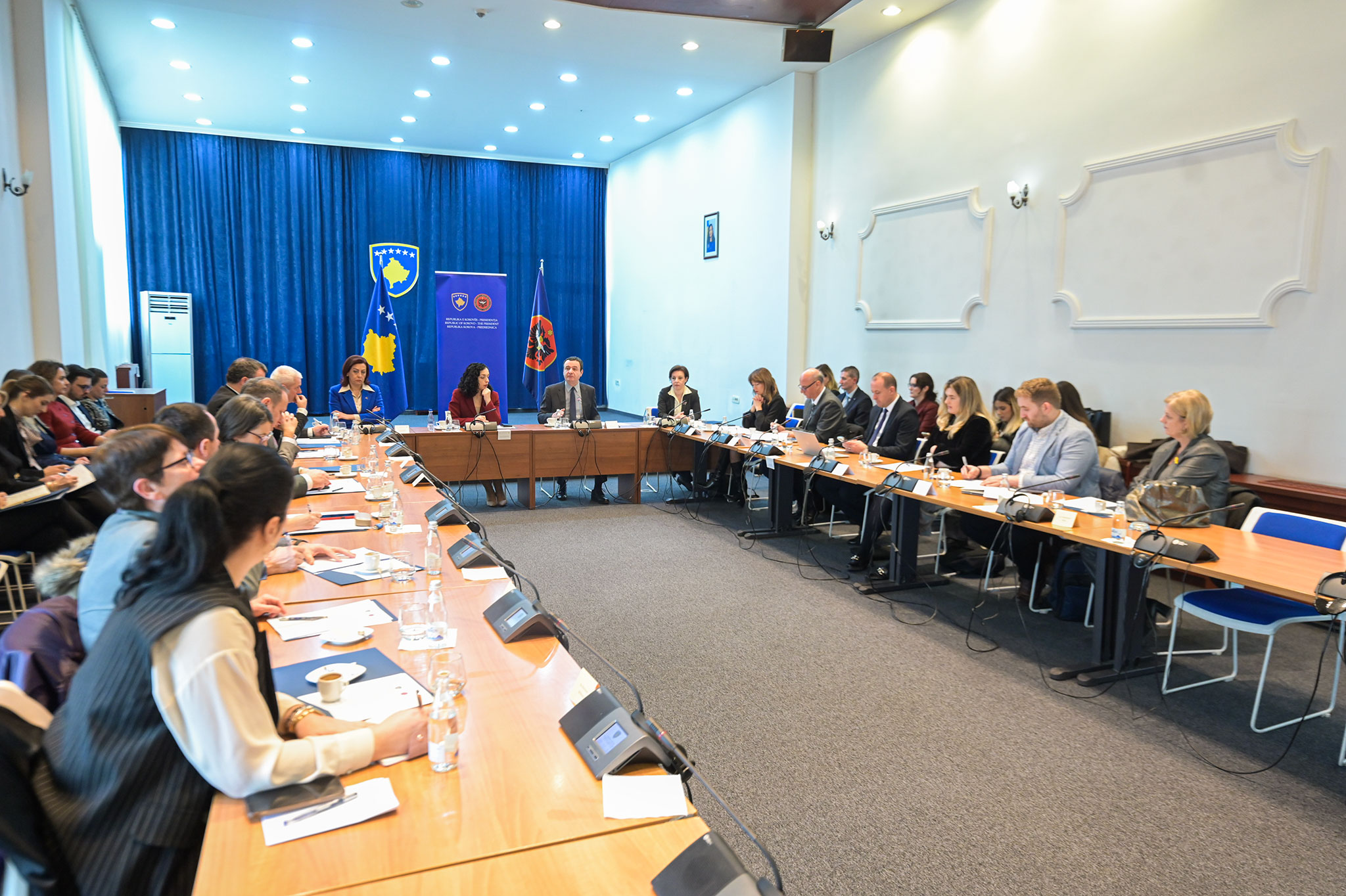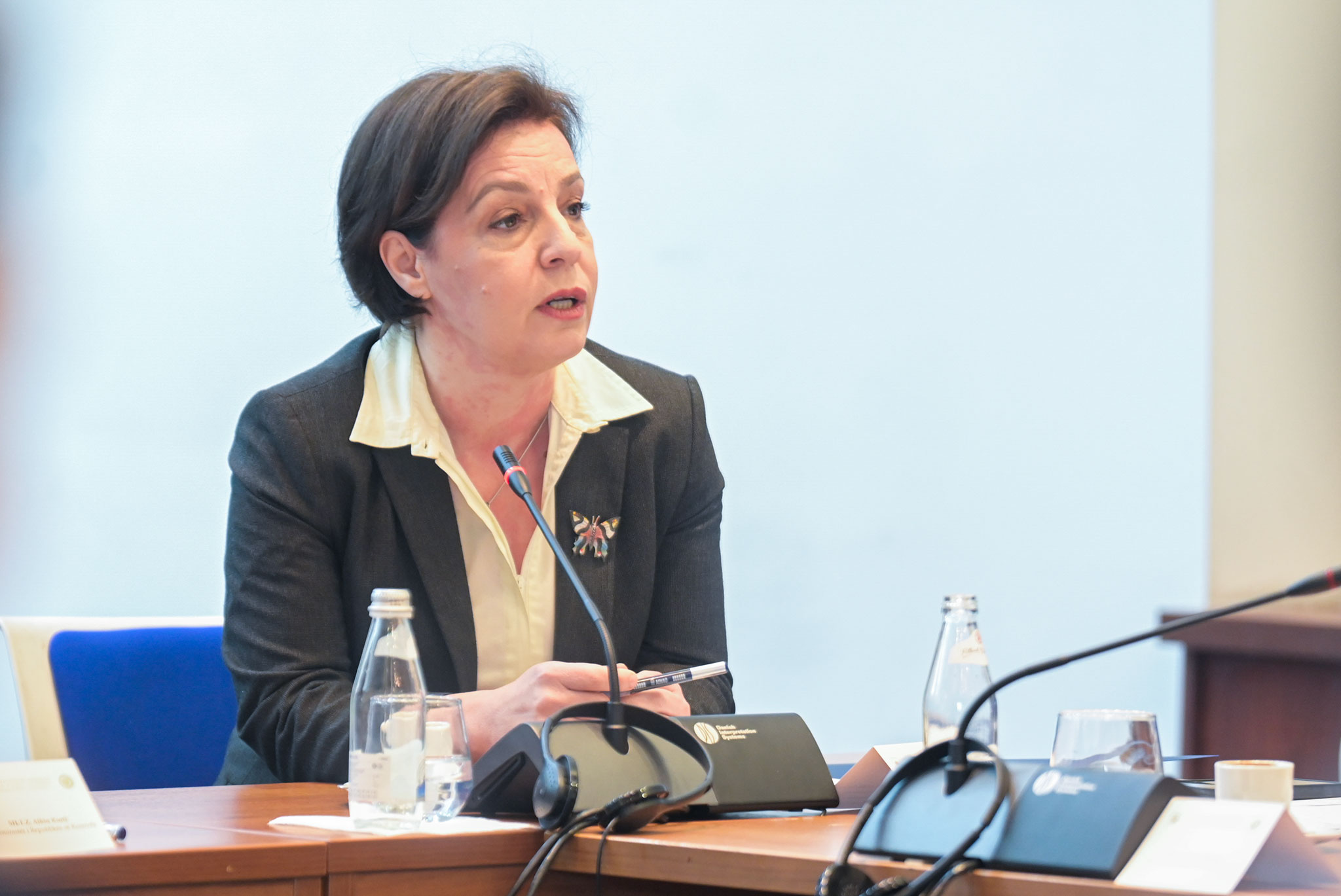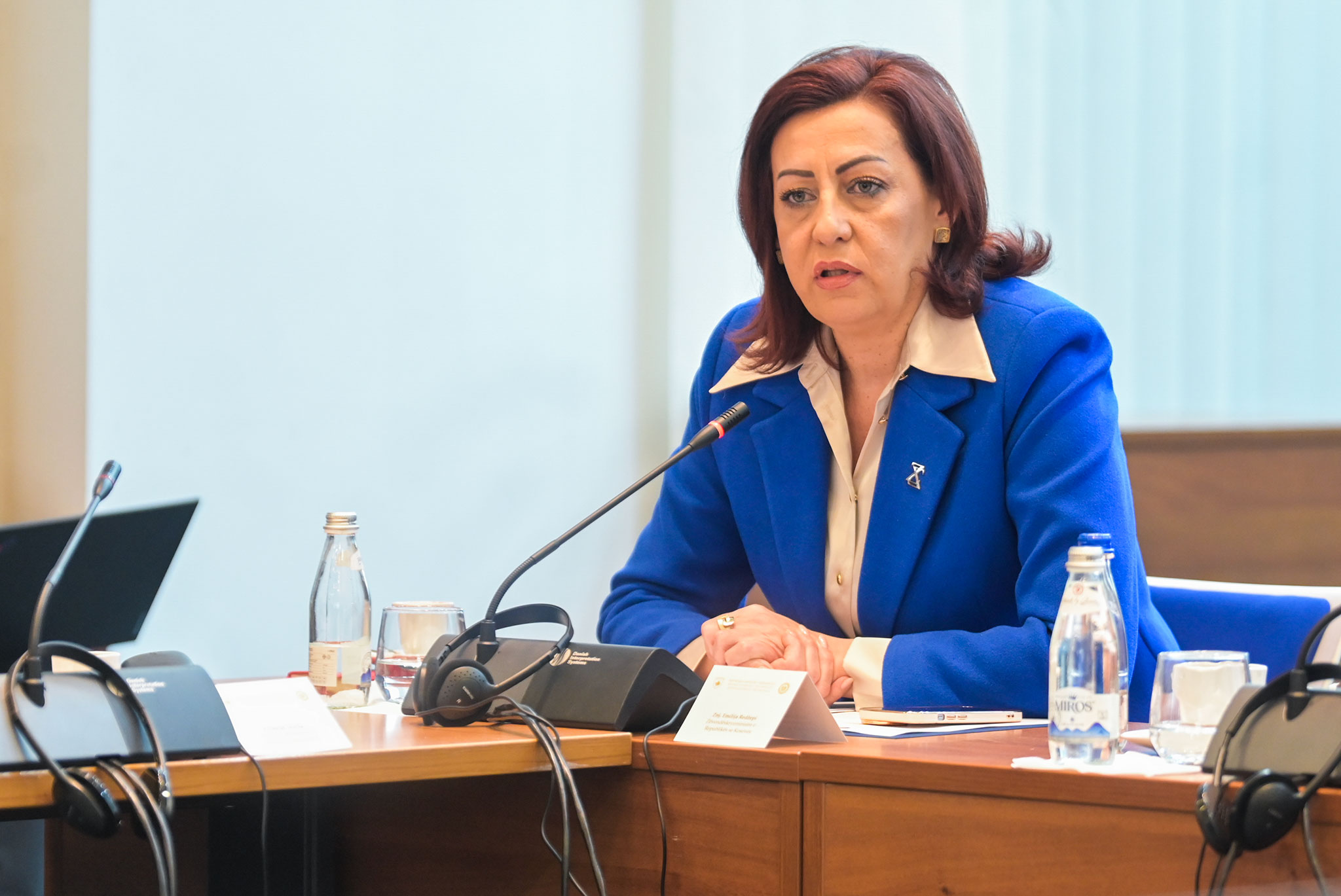Prishtina, 21 December, 2023
At the invitation of the President of the country, Vjosa Osmani – Sadriu, the Prime Minister of the Republic of Kosovo, Albin Kurti, participated in the third meeting of the Council for Democracy and Human Rights.
In his speech, Prime Minister Kurti thanked President Osmani for the opportunity to speak to him about the achievements and challenges in the areas of rule of law and prevention of gender-based violence. He said that our Government sees these two areas as interrelated, even inseparable. “One of the simplest, and I believe well, definitions of democracy is the law on politics, and this should be everywhere all the time”, he said.
Speaking about the difficulties and challenges encountered during this mandate, but also the progress achieved and the successes that have happened and are expected to happen in the future during the government, Prime Minister Kurti added that it is our constitutional, legal and moral obligation to continue the journey towards a society where all citizens, men and women, girls and boys, are treated equally, regardless of their sex or gender.
In this regard, he recalled the immortal words of a fighter for equality before the law, Martin Luther King, Jr.: “Harku i gjithësisë së moralit është i gjatë por përkulet drejt drejtësisë” (In English: “The arc of the moral universe is long, but it bends toward justice”)
Prime Minister Kurti’s complete speech:
Dear Ms. Vjosa Osmani – Sadriu, president of the Republic of Kosovo,
Dear Deputy Prime Minister of the Government of the Republic of Kosovo, Mrs. Donika Gërvalla – Schwarz and Mrs. Emilija Rexhepi,
Dear Ministers of Justice and Internal Affairs, Mrs. Albulena Haxhiu and Mr. Xhelal Sveçla,
Honorable Naim Qelaj, People’s Advocate,
The honorable Mr. Kreshnik Radoniqi, chairman of the Central Election Commission,
The honorable Mr. Albert Zogaj, chairman of the Judicial Council of Kosovo,
The honorable Mr. Yll Buleshkaj, Director of the Anti-Corruption Agency,
The honorable Mr. Jetish Maloku, head of the Prosecutorial Council of Kosovo,
Dear representatives of civil society, leaders of non-governmental organizations,
Dear attendees,
Thank you, Mrs. President, for the invitation to participate in the third meeting of the Council for Democracy and Human Rights. Thank you for the opportunity to speak to you about the achievements and challenges in the areas of rule of law and prevention of gender-based violence. In fact, our Government sees these two areas as interrelated, even inseparable. One of the simplest, and I believe well, definitions of democracy is law over politics, and this should be everywhere all the time.
But let’s start with the rule of law, which on the one hand is closely related to human rights and on the other hand to the very notion of democracy. The Government’s achievements in strengthening the rule of law state are already known, both in Kosovo and internationally. Especially in the fight against crime and corruption, official data clearly speak of successes in every corner of the Republic. During the current mandate, 34 illegal roads have been closed, 26 of them in the north of the country. 16 drug laboratories have been destroyed, 9 of them also in the north. Over 2.2 tons of narcotic substances have been confiscated and over 14 million euros have been seized under the suspicion of misuse of money laundering. 30.6 million euros of goods were confiscated by the operations of the Kosovo Customs. Our progress in fighting crime and corruption has been confirmed internationally, as for example, by the Corruption Perception Index of Transparency International, where Kosovo has improved by 20 places in just two years.
We have had a major challenge in terms of the rule of law in the north of the country, where organized groups orchestrated from Belgrade have tried to put a political spin on their organized crime, people we know well from smuggling and various crimes during these post-war years have simultaneously tried to appear as agents with political causes.
However, it is clear that in this case even the population there did not support them and it is an element of our optimism as the Government, that unlike, let’s say, three decades, the nationalism of the masses no longer exists as fuel for the war machines of dictators. There are only organized criminal groups that imitate the “Wagners of the Night Wolves”, but they do not have the support of the people and our state has faced them with the force of the law.
What I need to emphasize, however, is that there is a lot of information about crimes last year and this year. The year when we had paramilitary barricades, this year when we had paramilitary attacks, but these many pieces of information, although they have turned into many investigations, have not been reflected in many indictments. We have very few indictments for the countless crimes committed against citizens, our constitutional and legal order, territorial integrity and the law in Kosovo, both in 2022 and in 2023.
Even when there were arrests and accusations, there were releases under house arrest, there was treatment which did not discourage criminals.
On the other hand, a challenge as a Government that we have had is the fact that our reforms have ended up in the Constitutional Court. From November 16 of last year to November 2 of this year, i.e. one year minus two weeks, we have ten super important laws of our reform with which we won the trust of the citizens in February 2021, under the slogan “Justice and Employment’, which either remain stuck in the Constitutional Court or were overthrown or deformed there.
And, we all know that the Assembly of the Republic of Kosovo has a Parliamentary Commission for legislation, and all issues of laws sponsored by the Government and then voted on by the Assembly are dealt with there. However, we have a strange kind of activism which delays the reforms for us and wastes the precious time of the people of Kosovo and of our republic as a state. So, ten laws in less than a year stuck for months and months in the Constitutional Court.
The rule of law, in the literal sense of the concept, goes beyond the application of current laws. In addition, the rule of law embodies the principle that every individual should be considered and treated as equal before the law. This is the essential meaning of the saying “the rule of law and not of men”. Our current laws, therefore, should not be taken for granted. On the contrary, they must be constantly reformed to prevent the rule of some individuals or groups over others or against the state. The implementation of this principle is one of the most difficult challenges we face, especially in the case of women and girls, against men and boys.
Faced with this challenge, we have taken some important steps. Among them was the improvement of criminal legislation for handling cases of gender-based violence. In these cases, our judicial system has often responded to serious crimes with light sentences. Many of these cases have also not been investigated or reviewed with due urgency.
This year, we have made significant progress in addressing these two problems.
At the proposal of the Government, namely the Ministry of Justice, the Assembly approved Law No. 08/L-188 for supplementing/amending the Criminal Code. This law provides for tougher penalties for criminal offenses of rape and domestic violence, including, for example, a driving ban and a ban on running for public office for a certain period of time. With this reform, abusers will no longer be allowed to continue their lives as if nothing happened.
Also, the Assembly has approved Law No. 08/L-187 for supplementing/amending the Code of Criminal Procedure, providing that, for acts of rape and domestic violence, the investigation must be completed within a period of one year. Whereas, the judicial examination of these cases must be completed within 60 or 90 days when the examination is held by a single judge, and 90 days when it is held before a jury. This will ensure that more cases are treated with the appropriate urgency.
It is worth noting that these reforms were necessary not only morally, but also legally. The Council of Europe Convention on preventing and combating violence against women and domestic violence or the “Istanbul Convention”, as it is otherwise known, is now part of our Constitution. It is expressly stated there, that I am quoting: “The parties take the necessary legislative measures … to protect all victims from further acts of violence.” The legislative changes approved this year, in our country, were therefore some of these “necessary legislative measures”, provided for by the “Istanbul Convention”.
These reforms of criminal legislation, although necessary, are still not sufficient. Because we cannot efficiently fight gender-based violence, if we do not simultaneously address the roots of this phenomenon in patriarchal, exploitative, discriminatory mentality and practices. This mentality and these practices are present and even still prevail in various circles of our society. According to the Convention on the Elimination of All Forms of Discrimination against Women, also part of our Constitution, member states are obliged, and I am quoting: “to change the characteristics and social and cultural patterns of behavior of men and women, in order to achieve to eradicate prejudices and customary practices, and all other practices, which are based on the idea of inferiority or superiority of one or the other sex, or on stereotypical roles of man and woman,” the quote ends. Without changing these biases and practices, the success of our fight against gender-based violence will remain limited.
This is one of the reasons why the Government has followed what is called in English, “whole-of-government approach”, i.e. a holistic approach where the whole Government is used, not just a department, to advance any given priority.
Of course, reforming criminal legislation also plays a role in gradually changing harmful stereotypes. In this direction, as part of the completion/amendment of the Criminal Code, we have added a new criminal offense, namely, the offense of obliging another person to perform an examination for the purpose of virginity testing.
In addition, we have used other tools available to the Government, such as, for example, scholarships for girls in STEM, science, technology, engineering and mathematics. In less than three years of government, we have distributed 4,630 such scholarships, significantly increasing the number of girls in these fields, where due to sexist prejudices, they have not been sufficiently involved. The government has also taken measures to strengthen women’s financial independence. We have done this with our Child and Maternity Allowance programme. So far, about 90,000 women have opened bank accounts for the first time as a result of this child and maternity program. It means that we have managed to also have the participation of women and girls in the economic activity outside the family, much greater than before. And here it is obvious that the “Support for employment of women” measure, which was reopened in December of last year, with 522 women beneficiaries, has also had an impact through Superpuna, 8,496 young people have been employed, most of them girls: 4,311 in total. The idea that a woman’s place is at home has no place in our society. For all young people under the age of 25 compared to 2021, today we are talking about the number of employees has doubled and in this doubling women are more than 50 percent. So something big is happening in the youth. And this will be our big socio-political change in the next few years, but within this decade anyway.
Of course, we cannot, nor should we, stop there. Fighting the patriarchal mindset and discriminatory practices is not easy, nor quick. And the impact of this war on reducing cases of violence is even more indirect and long-term. We live in a time when, every few months, we are faced with shocking cases of violence against women and girls, with fatal effects, each case more horrific than the next. Faced with these cases, it would be understandable if some citizens lose hope that this macabre situation will improve over time. But nevertheless, we have a duty not to give up and to work even harder. It is our constitutional, legal and moral obligation to continue our journey towards a society where all citizens, men and women, girls and boys, are treated equally, regardless of their sex or gender. In this regard, let me conclude with the immortal words of a fighter for equality before the law, Martin Luther King, Jr. which says that: “The arc of the moral universe is long, but it bends toward justice”, in an improvised translation from here on my part ” “Harku i gjithësisë së moralit është i gjatë por përkulet drejt drejtësisë”.
Thank you.
Last modified: December 21, 2023
